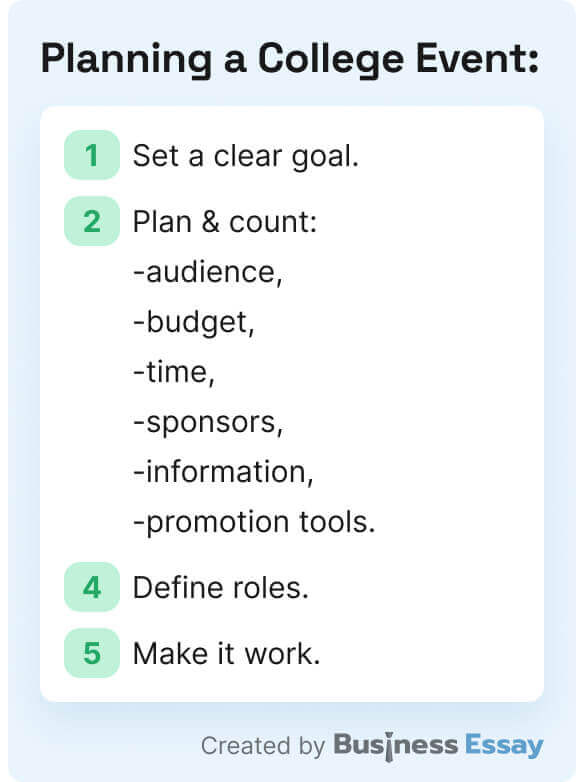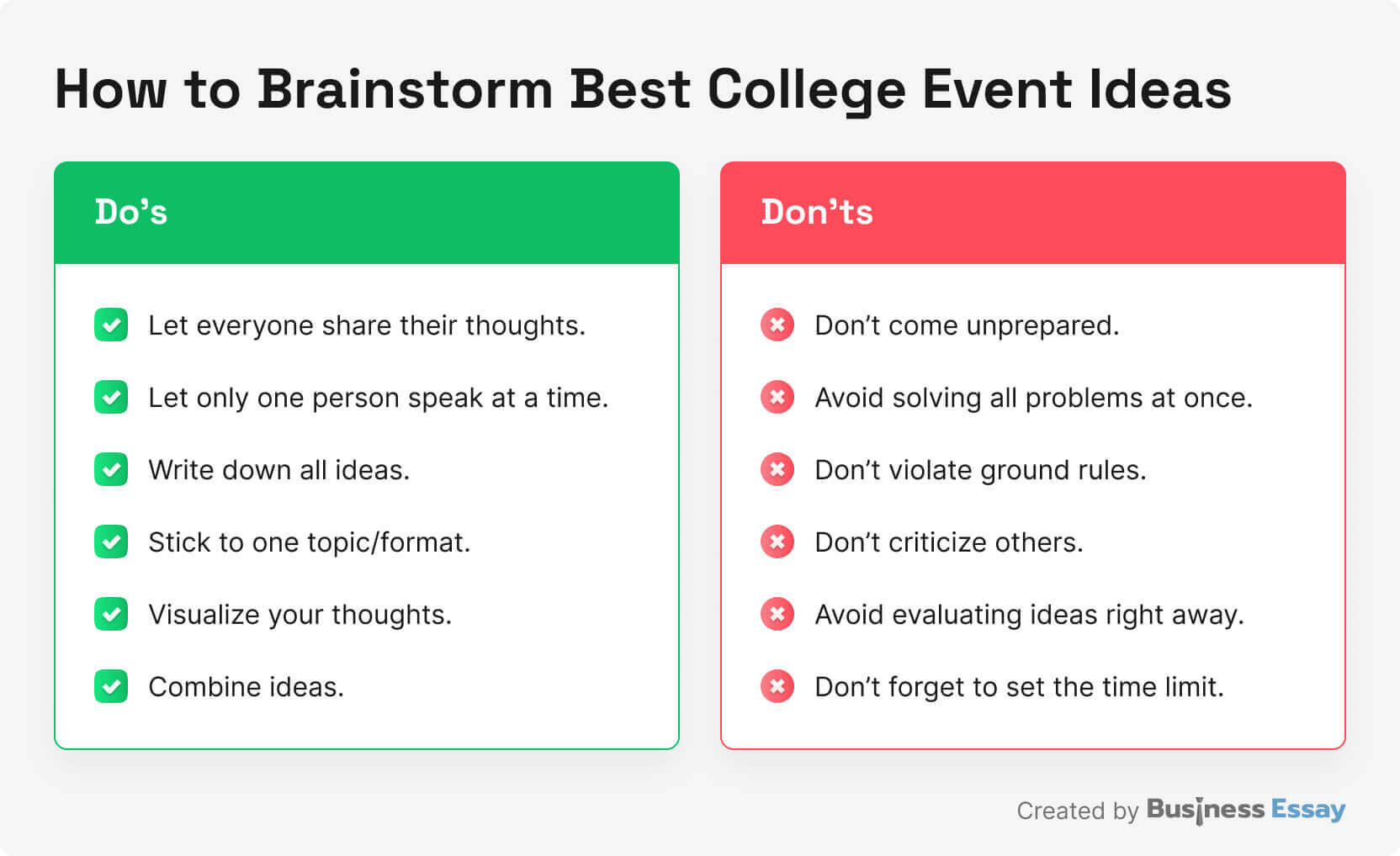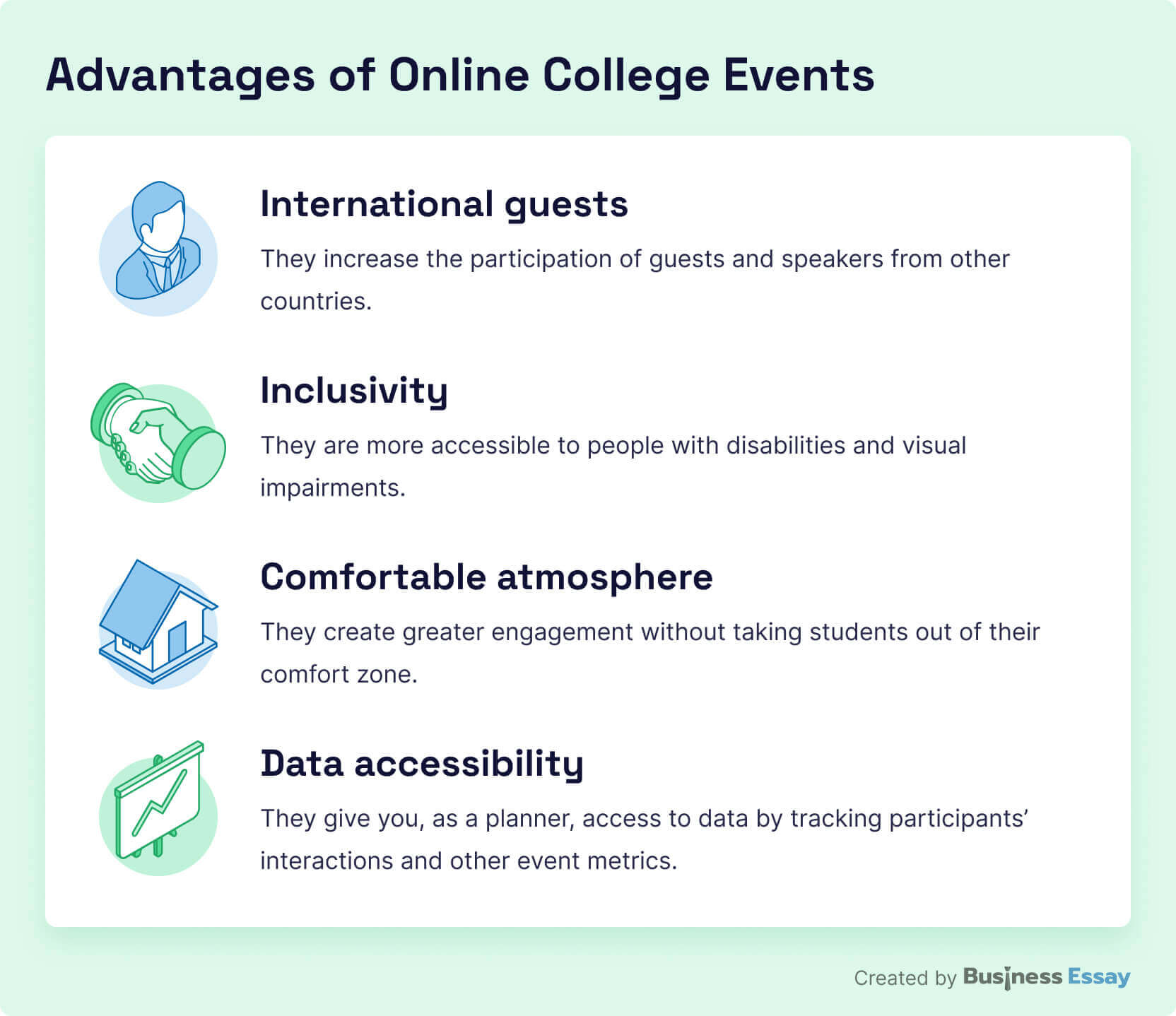
Imagine that several years after graduation, someone asks what you liked best about college. Many people would say they miss having new experiences every day. Indeed, besides gaining ample academic knowledge, students have great opportunities for personal development and networking during their college years.
If you want to make the most of your college career, consider planning a college event. This life-changing experience will improve your leadership skills, reinforce your time management skills, and help you form new friendships. In this article, we’ll cover everything you need to know about event planning, so don’t miss out on this opportunity!
And, of course, don’t miss our database with free research essay samples; it’s updated regularly!
🎭 College Event Formats
Organizing an on-campus event is a wonderful way to interact with other students and the people who work at your college. Consider these ideas before choosing an event:
- Educational workshops. Workshops are a fantastic way to learn new things in a fun environment. When planning an educational event, it’s essential to find a format that differs from daily activities and encourages students to participate.
- TEDx talks.
- Meetings with graduates.
- Conferences/symposiums.
- Open talks with a guest expert.
- Career fairs. For students nearing graduation, the most valuable experience is getting a hint of their future professional life. Many companies are willing to send representatives to meet with potential employees at college career fairs, business networking events, and skills seminars.
- Company exhibitions.
- CEO open talks.
- CV-writing workshops.
- Concerts and performance. College life is an excellent time for young people to experience art and culture. You can turn your campus into a performance hall for musicians, writers, and other artists to demonstrate their talent.
- Slam poetry festivals.
- Art exhibitions.
- Music festivals.
- Talent shows.
- Theatre workshops.
- 24-hour film festivals.
- Comedy nights.
- Sports events. Having regular sports events on campus is a powerful way to improve students’ physical and mental health. Additionally, performing physical activities as a group enhances teamwork and heightens the spirit of solidarity.
- Night hikes.
- Campus campouts.
- Campus marathons.
- Obstacle races.
- Volunteer opportunities. Volunteer work is definitely worth the effort because it allows students to grow as people and change the world for the better.
- Campus trash cleanups.
- Meetings with local business owners.
- Charity casino nights.
- Trips to animal shelters.
- Tutoring events.
📋 How to Plan a College Event: 4 Steps
Every successful college event starts with planning. In this section, we’ll look closely at the preparation stages to make sure your event goes smoothly.

Step 1: Set the Goal
Event planning starts with defining your goal for participants, sponsors, and yourself as a host. By identifying the primary goal, you create a clear picture of what types of resources you need and how long it will take you to organize the event.
Moreover, a well-defined goal helps create an efficient organizational team. Brainstorm a goal together to make a detailed plan for your college event and ensure everyone shares the responsibilities.
Step 2: Plan & Count
It’s time to come up with a step-by-step plan. You can use a progress-tracking web application, an Excel spreadsheet, or an old-fashioned pen and paper. This document should be available to the entire team so that everyone can update it with information and plan the next steps.
Begin your event planning by breaking your goal into precise tasks with deadlines. Making these steps specific will keep the team focused; that way, you won’t get lost in the preparatory process. Moreover, you can show your plan to your college’s administration or possible sponsors to gain their support and receive feedback.
Audience
- Considering your audience is essential both for public and private events. Ask yourself: “What does the audience expect at the event? What will make them physically and emotionally comfortable?” Think about your target audience and their needs in advance to determine how to fulfill them.
- Make sure the invitations are engaging and contain all the necessary information about your event’s place, time, and activities.
- One final piece of advice here is to use emotion to reach your audience before explaining the logistical information. This simple hack will ensure more people will participate in your event.
Budget
- One of the most challenging parts of event preparation is defining your budget. Your event budget is a forecast of all expenses and revenues. Don’t worry if you cannot predict all the costs at the beginning. Some of these might even change over time. The purpose of planning an event budget is to reveal areas where you will need to negotiate prices or make necessary cuts.
- College budgets are often tight, so you might consider looking for sponsors. And don’t forget to thoroughly explain to potential donors what they will spend their money on. Keep your event budget detailed and transparent. Brainstorm ways to make your event elegant but budget-friendly.
Other Resources
Some other essential resources to consider when planning a college event are:
- Time. Make sure not to fall into the trap of organizing a massive event in a short time. Time is a valuable resource, so it’s better to start preparing as early as possible and keep your deadlines realistic.
- People. It is essential to consider not only your teammates who will participate in the event organization but other people you might reach out to for help. Contact the college office, event speakers, or sponsors in advance if you want to build successful cooperation.
- Information. Whether you are planning a cultural or educational event, you must conduct research on similar activities. Check out the previous events held on campus and identify their mistakes.
- Promotion tools. Think about how you can promote your event. For example, you might want to publish an invitation on your college’s website, share the event date on the campus calendar, or create social media accounts. There are also more old-fashioned ways of promoting, like flyer distribution.

Step 3: Define Roles
Managing a college event yourself can be stressful, but it will become an exciting experience if you have people with whom to share responsibilities. Usually, the event planning team includes the following roles:
- Event director. A director decides the event goal, builds the team, defines the budget, and manages external partnerships.
- Event coordinator. A coordinator controls the entire event process by supervising the rest of the team to ensure everything goes as planned.
- Technical director. A technician is responsible for everything needed during the event.
- Promoter. A promoter is in charge of event communication online and offline, as well as social media posts and invitations.
- Designer. A designer focuses on your event’s visual components, including the decor of the event location.
- Event assistance. Event assistants are needed on campus to help manage the entrance, check people in, and be on hand for any extra help.
It is important to note that these roles and responsibilities might vary depending on a specific event. Some people might take on several functions, whereas other roles might not be necessary at all.
Step 4: Make It Work
When planning a successful event, meeting goals at each stage is essential, as is sharing feedback with your teammates. Set aside time to regularly meet with the event planning team and discuss the problems you’ve encountered. This is how you can create a tight team and an engaging atmosphere at your event.
✅ Planning an Event: Checklist
We prepared this event planning guide to ensure you don’t miss out on anything. You can use it during all the stages of the planning process or just a few days before the event to check if everything’s ready.
- Review the concept of your event.
- What is the goal of your event?
- Have you discussed the event with your college administration?
- Have you contacted the speakers for your event and sent them all the necessary information?
- Review the event date and location.
- Are there any other events scheduled on this date? Will there be a time conflict?
- Will the location accommodate the number of people and the necessary set-up?
- If your event takes place outside, have you considered the weather conditions?
- Review accessibility and safety.
- Have you considered the special-needs guests?
- Do your event coordinators know what emergency procedures to follow?
- Are there any Covid-19 restrictions on your campus?
- Review staff and set-up.
- How much time is needed to set up the event?
- How many people do you need to assist with the set-up and event activities?
- Who will be responsible for the cleanup after the event is over?
☝️ Tips on How to Organize a Successful Event
We’ve collected five powerful tips to help you create the best college event experience. Take a look at them if you want to grow your audience and make your event memorable.
- Delegate tasks. A successful event cannot happen without help from your team, college, or sponsors. Don’t try to do everything by yourself. Instead, delegate tasks and improve your leadership and management skills.
- Be ready to negotiate. Event planning is the best time to exercise your negotiating skills. Often things don’t go as planned, so you must reach compromises with those involved in the event. Decide on your goals in advance but consider a backup plan if you get pushed back.
- Know the importance of branding. Choosing the right theme, logo, and color scheme is important if you want people to remember your event. Create positive associations with your event to sell more tickets and secure sponsors and speakers.
- Get social. Don’t miss an opportunity to bring attention to your event and hype up your college. Prepare some visuals for Facebook and Instagram to share the planning process and showcase the event. Take lots of photographs during the event so that people will remember it afterward.
- Stay calm and have fun. Don’t be too critical of yourself if something doesn’t go as planned. Remember to enjoy the event yourself and have fun with the guests!
💻 BONUS: Virtual Event Ideas for College Students
The lockdown is over, and you wonder if virtual events are worth it?

During the lockdown, all the educational processes switched to an online format. The same happened with all on-campus events and activities. Surprisingly, virtual events turned out to be highly successful, offering greater flexibility for attendees and requiring less cost to organize.
If you’re planning a virtual college event, here are some ideas:
- Online book clubs.
- Trivia game nights.
- Photo contests.
- Virtual watch parties.
- Virtual career fairs.
- PowerPoint parties.
- Live-streamed concerts.
- Online workshops.
- Language learning groups.
- Virtual museum tours.
- Movie discussion clubs.
- Most creative TikTok competitions.
- Online stand-up comedy events.
- Online tutoring.
- Virtual debate clubs.
As for the planning process, virtual events consist of the same steps but focus on technological advancements. Luckily, there are plenty of virtual platforms for you to try – for example, Goldcast, Hopin, and Zoom.
While some students value face-to-face interactions, others choose the comfort of virtual events. Either way, as a planner, you can have a unique experience working as a team and improving your delegating and negotiating skills.
Organizing a college event can be a wonderful experience. Without a doubt, it will create memories that will bring a smile to your face. At first, the whole planning process might feel overwhelming. However, if you surround yourself with a team, set an inspiring goal, and share responsibilities, you will handle it successfully. Don’t miss out on such a great experience during your college years!
🔗 References
- Event Planning Guide | Academic and Event Scheduling
- Pre-Planning Checklist – Event Planning Guide | The University of Texas at Dallas
- University Event Planners: 4 Event Management Tips
- Event Goals and Objectives: The 5-Step Guide with Examples
- 5 Tips for Bringing New Life to Your University Event Planning | Formstack Blog
- Virtual Event Ideas | Student Clubs and Organizations | Ithaca College